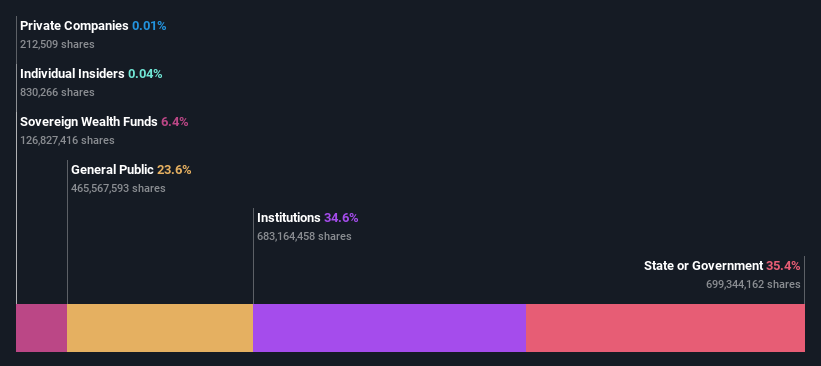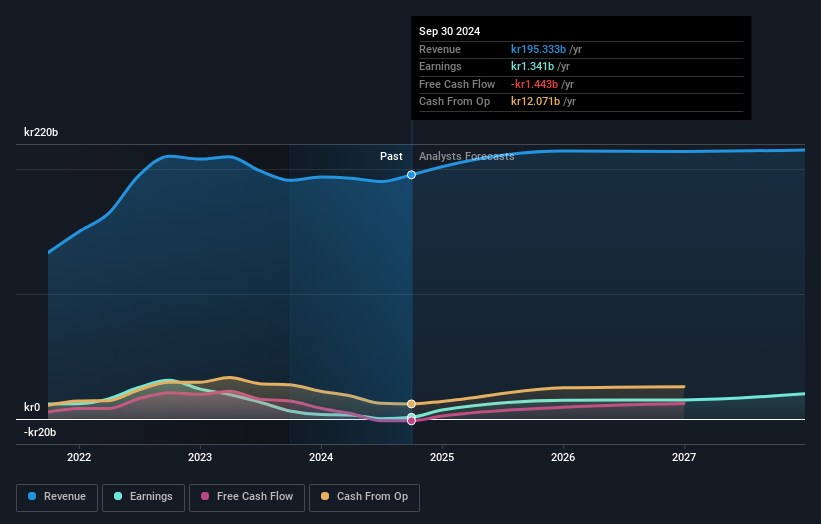- Norway
- /
- Metals and Mining
- /
- OB:NHY
Norsk Hydro ASA (OB:NHY) most popular amongst state or government who own 35% of the shares, institutions hold 35%

Key Insights
- The considerable ownership by state or government in Norsk Hydro indicates that they collectively have a greater say in management and business strategy
- The top 5 shareholders own 52% of the company
- Institutions own 35% of Norsk Hydro
If you want to know who really controls Norsk Hydro ASA (OB:NHY), then you'll have to look at the makeup of its share registry. And the group that holds the biggest piece of the pie are state or government with 35% ownership. In other words, the group stands to gain the most (or lose the most) from their investment into the company.
Meanwhile, institutions make up 35% of the company’s shareholders. Generally speaking, as a company grows, institutions will increase their ownership. Conversely, insiders often decrease their ownership over time.
Let's take a closer look to see what the different types of shareholders can tell us about Norsk Hydro.
See our latest analysis for Norsk Hydro

What Does The Institutional Ownership Tell Us About Norsk Hydro?
Institutions typically measure themselves against a benchmark when reporting to their own investors, so they often become more enthusiastic about a stock once it's included in a major index. We would expect most companies to have some institutions on the register, especially if they are growing.
Norsk Hydro already has institutions on the share registry. Indeed, they own a respectable stake in the company. This implies the analysts working for those institutions have looked at the stock and they like it. But just like anyone else, they could be wrong. It is not uncommon to see a big share price drop if two large institutional investors try to sell out of a stock at the same time. So it is worth checking the past earnings trajectory of Norsk Hydro, (below). Of course, keep in mind that there are other factors to consider, too.

Norsk Hydro is not owned by hedge funds. Our data shows that Narings- Og Handelsdepartementet is the largest shareholder with 35% of shares outstanding. For context, the second largest shareholder holds about 6.4% of the shares outstanding, followed by an ownership of 5.4% by the third-largest shareholder.
On looking further, we found that 52% of the shares are owned by the top 5 shareholders. In other words, these shareholders have a meaningful say in the decisions of the company.
While it makes sense to study institutional ownership data for a company, it also makes sense to study analyst sentiments to know which way the wind is blowing. There are a reasonable number of analysts covering the stock, so it might be useful to find out their aggregate view on the future.
Insider Ownership Of Norsk Hydro
While the precise definition of an insider can be subjective, almost everyone considers board members to be insiders. Company management run the business, but the CEO will answer to the board, even if he or she is a member of it.
Most consider insider ownership a positive because it can indicate the board is well aligned with other shareholders. However, on some occasions too much power is concentrated within this group.
Our most recent data indicates that insiders own less than 1% of Norsk Hydro ASA. As it is a large company, we'd only expect insiders to own a small percentage of it. But it's worth noting that they own kr55m worth of shares. It is always good to see at least some insider ownership, but it might be worth checking if those insiders have been selling.
General Public Ownership
With a 24% ownership, the general public, mostly comprising of individual investors, have some degree of sway over Norsk Hydro. While this group can't necessarily call the shots, it can certainly have a real influence on how the company is run.
Next Steps:
It's always worth thinking about the different groups who own shares in a company. But to understand Norsk Hydro better, we need to consider many other factors. Case in point: We've spotted 3 warning signs for Norsk Hydro you should be aware of, and 1 of them is significant.
If you would prefer discover what analysts are predicting in terms of future growth, do not miss this free report on analyst forecasts.
NB: Figures in this article are calculated using data from the last twelve months, which refer to the 12-month period ending on the last date of the month the financial statement is dated. This may not be consistent with full year annual report figures.
Valuation is complex, but we're here to simplify it.
Discover if Norsk Hydro might be undervalued or overvalued with our detailed analysis, featuring fair value estimates, potential risks, dividends, insider trades, and its financial condition.
Access Free AnalysisHave feedback on this article? Concerned about the content? Get in touch with us directly. Alternatively, email editorial-team (at) simplywallst.com.
This article by Simply Wall St is general in nature. We provide commentary based on historical data and analyst forecasts only using an unbiased methodology and our articles are not intended to be financial advice. It does not constitute a recommendation to buy or sell any stock, and does not take account of your objectives, or your financial situation. We aim to bring you long-term focused analysis driven by fundamental data. Note that our analysis may not factor in the latest price-sensitive company announcements or qualitative material. Simply Wall St has no position in any stocks mentioned.
About OB:NHY
Norsk Hydro
Engages in the power production, bauxite extraction, alumina refining, aluminium smelting, and recycling activities; and provision of extruded solutions worldwide.
Excellent balance sheet with reasonable growth potential.

